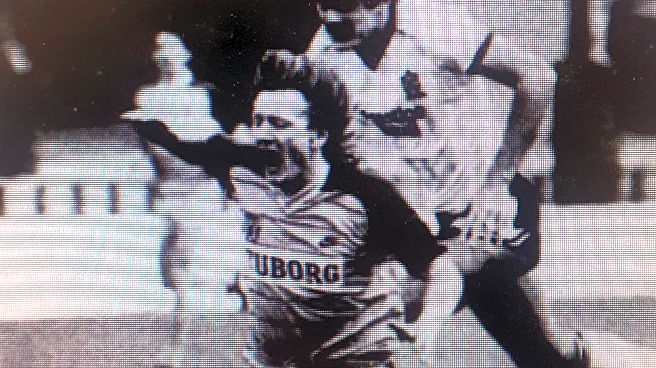A sensational victory over Chelsea last weekend extended an impressive unbeaten league run in the capital for Sunderland. Stamford Bridge neighbours Fulham were the last team to beat us in a London league clash back in April 2018, but it has not always been this good in the smoke unfortunately.
Early 1985-86 for example saw narrow losses to Crystal Palace, Millwall and Charlton Athletic in quick succession, and whilst the cup run to Wembley the season before had brought some good results at Palace, Tottenham
and Chelsea, when points had been at play it was a different story, with defeats to the latter two, plus Arsenal and Queens Park Rangers, going a long way to confirming relegation. Even the trip to the national stadium for the Milk Cup final proved to be a wash out, and so it was with understandable trepidation that the Lads headed back down towards the Thames in November.
Craven Cottage was the exact destination and of course, even though results had been far from ideal the team were still backed by good numbers – exiled fans and those travelling from the North East making up a large proportion of the crowd and boosting the gate by over 1,000 more than the Fulham average that campaign. All hoping for a reverse in recent London trends, the red and white army were about to be rewarded for their loyalty too, as Sunderland got to grips with their boroughs hoodoo.
Joining the paying supporters in the stands was a healthy number of scouts in the wake of managing director Lawrie McMenemy announcing earlier in the week that 13 players had been made available for transfer. Amongst the baker’s dozen that had been circulated were David Corner, Paul Lemon, John Moore, Clive Walker and Ian Wallace, whilst joining them on the transfer list at their own request were Rueben Agboola and David Hodgson. Of those being allowed to leave, Steve Berry was thought to already be in talks with Darlington, whilst Peter Daniel was spending the weekend in Lincoln and was due to take in the Imps’ game with Blackpool as he considered a move to Sincil Bank.
Bradford City had been reported as being interested in some of the players, with their rising man Stuart McColl supposedly being used as bait. Gary Bennett, Howard Gayle, Nick Pickering and Barry Venison meanwhile were expected to attract clubs further up the pecking order, with the quartet going straight back into the shop window after being handed starting slots in the side.

Whether anybody in a Sunderland shirt but Bob Bolder caught the eye in the opening stages however was up for debate. Fulham looked much the stronger and took a deserved, albeit slightly controversial lead in the 34th minute, when Dean Coney beat the in-form stopper from what appeared to be an offside position. McMenemy’s picks could hardly complain in the grand scheme of things though, and they perhaps had to be grateful for another call from the officials that helped them get back on equal terms after the break.
Gayle broke clear and was dragged down by the backtracking Cliff Carr, and following brief confirmation from one of his linemen, referee Mark Scott pointed to the spot. It seemed to be the correct decision, although questions were being asked amongst the Fulham defence as to why they had been caught cold, whilst their manager on the sidelines Ray Harford was already beginning to rue the string of wasted chances that had come before.
Eric Gates had no such doubts and remained ultra calm as he took his time over the penalty, deliberately checking his run up in order to make his adversary between the posts Gerry Peyton commit himself and allowing him to guide his attempt in the opposite direction for 1-1. Fulham themselves then made some speculative claims for a penalty as Pickering came away from a challenge on Kenny Achampong with the ball, but the tackle appeared clean – and there was no guarantee Bolder would have been beaten from 12 yards anyway.
The former Liverpool man, who just over a fortnight earlier had converted a loan move to Wearside into a permanent deal, had been strong all afternoon against the Cottagers, with a full-length dive to deny John Marshall being the pick of his saves. That stop had kept his side in the match, and with time running out Bennett turned one point into three, presumably increasing his asking price as he did so, when he popped up in the box to smash a low drive in off the base of the post.
The 2-1 win was a repeat scoreline of the previous away game, when the squad had made the much closer trip to Carlisle United, but gratifying as the victory was, the performance still left McMenemy looking for more from the team. Critical afterwards of the passing and retention of the ball in particular, he was complimentary at least of Venison yet was determined not to go back on his plans, seeing outgoing sales as the best way to continue his ongoing reimagining of the squad.
The group had started the season in dreadfully poor fashion but were now grinding out some more positive results, although fans that remember finally heading back from London in good spirits will just as easily recall that the boss’ mapped out vision never came off. McMenemy didn’t have the knowledge needed to make a success of things, and the club were soon sinking underground – by the time Sunderland were next in the capital it was for a heavy loss at Wimbledon, and they were becoming mindful of the diminishing gap between them and the third tier.
Saturday 2 November 1985
Canon League Division Two
Fulham 1 (Coney 33’)
Sunderland 2 (Gates (pen) 54’, Bennett 84’)
Sunderland: Bolder; Burley, Bennett, Elliott, Kennedy; Venison, Pickering, Gray, Gayle; Swindlehurst, Gates Unused: Atkinson
Craven Cottage, attendance 5,795


















